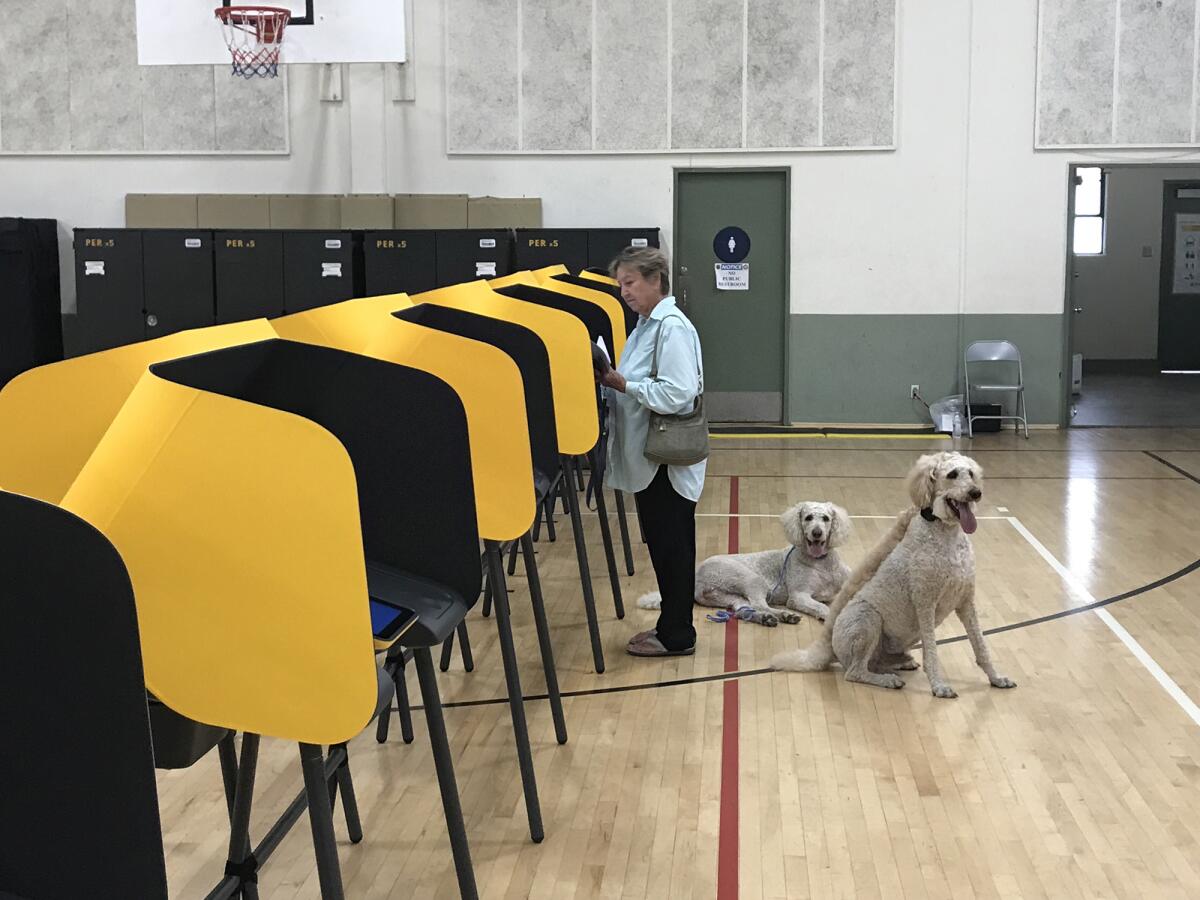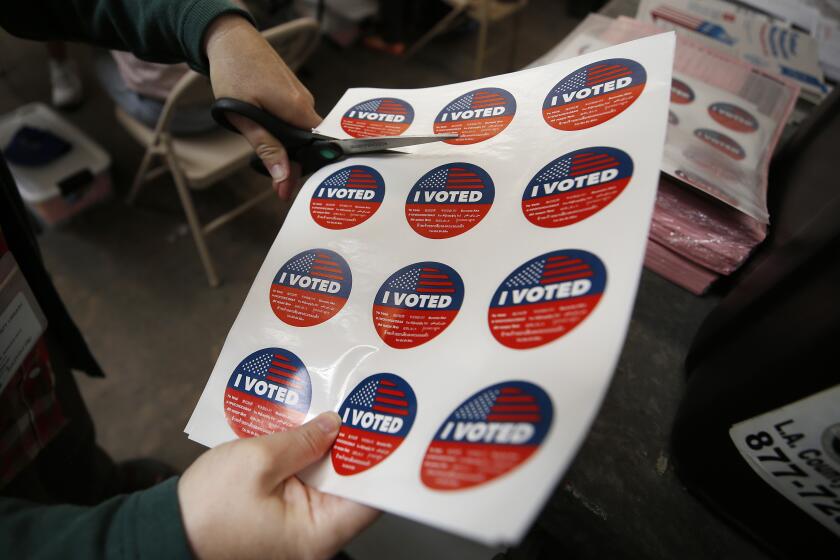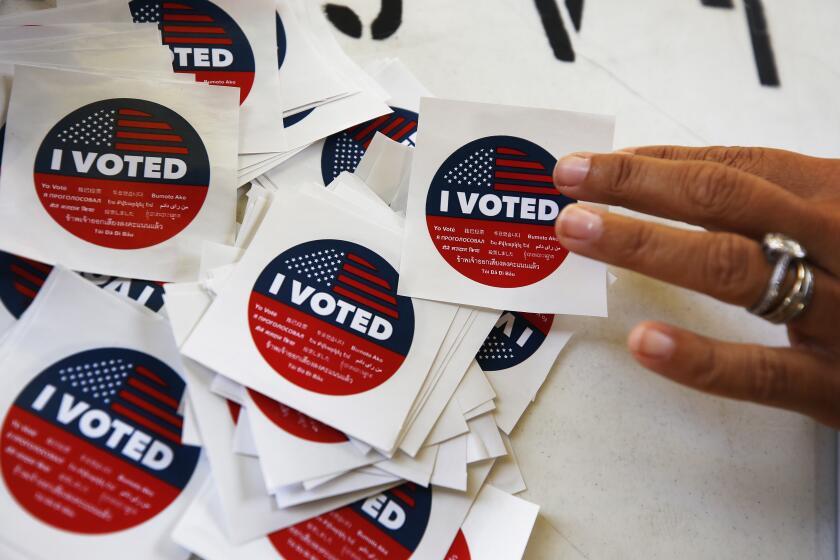Desperate for change, voters cast ballots in California’s low-turnout primary election

- Share via
When it came time to cast her ballot in California’s primary election, Robin Tillman made sure not to vote for a single incumbent.
“We need to eliminate the people already in because they’re not doing anything,” she said. “Look at our homeless.”
As Californians voted across the state Tuesday afternoon, weighing in on an election that will help determine Los Angeles’ next mayor, many said they sought to change a landscape beset by a homelessness crisis, crime and skyrocketing housing prices.
Early turnout was dismal before polling sites opened, and voting numbers showed few signs of progress Tuesday afternoon. Although every registered voter in the state was mailed a ballot, only 18% had gotten them to election officials or weighed in at early in-person vote centers, according to election data reviewed by consulting firm Political Data Intelligence.
For Tillman, homelessness and the lack of affordable housing are among the most serious issues in the city. The 54-year-old, who works as a clerk in the Department of Children and Family Services, said she knows many children in the system who have gone on to live on the streets.
People need more support, she said.
Tillman’s rent-controlled studio in downtown Los Angeles, which cost her $700 a month when she moved in six years ago, has since inched above $800. If someone were to sign a new lease today, it would cost $1,300, she said, adding that similar units in her building, which are listed on Airbnb, get rented out for $2,500 a month.
The city, she said, is desperate for change.
“Democrats, they need to stand up. By being passive, that has cost us a lot,” said Tillman, who supported Rep. Karen Bass (D-Los Angeles) for mayor. “There’s a lot of people hurting out here.”
The L.A. mayor’s race, the city’s first open mayoral primary in nearly a decade, is among the most closely watched on the ballot as city voters — many of whom will be choosing among top candidates billionaire developer Rick Caruso, L.A. City Councilman Kevin de León and Bass — signaled they were in a pessimistic mood.
“A hard-knocking fist,” said Weldon Ivory, who voted for Caruso. “That’s what you need downtown, someone to knock things around, change things.”
The 73-year-old retired security guard said he’d first heard about the real estate developer a few months ago after overhearing someone talk about him at a restaurant. Of the options for mayor, Ivory said, Caruso seems like the best bet to address problems he’s noticed in downtown — chief among them, he said, homelessness.
Here are the L.A. Times’ editorial board endorsements for elected offices in Los Angeles city and county, LAUSD, superior court, statewide offices, the state legislature and U.S. House and Senate seats.
Another voter, Christina Pak, picked Gina Viola for mayor.
The 28-year-old who works in the energy industry first considered voting for Bass — who she thought likely had a better chance of beating Caruso — but ultimately went with Viola, whose platform aligns more closely with her views.
In the City Council race, Pak picked community activist Albert Corado, whose stances on dismantling and defunding systems of policing and expanding tenants’ rights appealed to her. For city attorney, she picked Faisal Gill, but admitted that she wasn’t thrilled about any of the candidates.
“Seemed like the least worst choice,” she said, sighing.
California’s 2022 primary election is Tuesday. Here’s how to cast a ballot.
The election comes after a frantic few weeks of campaigning across the city, which has included increasingly personal and partisan attacks slung from each camp. Caruso’s supporters have attacked Bass’ attendance record in Congress, while Bass’ backers have talked nonstop about the businessman previously being registered as a Republican, as well as his previous ties to politicians who oppose abortion.
Since Caruso announced his candidacy in February, the Los Angeles Times’ polling has found the contest to be largely a two-person race, with Caruso and Bass appealing to contrasting bases of support.
Concerns over rising crime have provided the driving force behind Caruso’s campaign, which early on drew strong support from more conservative Angelenos, especially white voters. Over time, however, he also has won over a growing number of Latino and Black male voters, the poll found. Bass gained ground with the biggest segments of the city’s electorate — her fellow Democrats, liberals and women. She also has maintained a strong lead among Black women, the poll found.
A poll published Sunday showed 38% of likely voters support Bass. Caruso, who has bombarded L.A. airwaves with millions of dollars of advertising, has 32% support.
With 15% of likely voters saying they were still undecided, either of the two could still come out on top in the primary, but it’s unlikely either candidate would win the 50% needed to avoid a November runoff.
Voters also will cast their ballots for governor and U.S. senator, though Gov. Gavin Newsom and Sen. Alex Padilla — both Democrats — are expected to win those races.
California’s 2022 primary election ballot includes races for governor, attorney general, the Legislature and Congress, as well as local contests.
Tuesday morning, signs of the city’s low turnout were clear as poll workers at several centers in L.A. outnumbered voters.
“It’s been slow,” said Cristin Doyle, the lead poll worker at the Lincoln Park Senior Citizen Center in Lincoln Heights.
The center, which has been open for more than a week, hasn’t seen more than 20 voters per day, Doyle said, adding that she didn’t expect more than a few hundred people to come in Tuesday.
By the afternoon, Milan Whippa Wiley was determined to cast her provisional ballot to support Bass, or “Auntie Karen.” The 39-year-old said she was kicked off the voter roll when she renewed her driver’s license and came to her alma mater, Crenshaw High School, to ensure that her choice for mayor would be counted.
“I’ve been to two polling places now — I’ve been dealing with this for hours,” she said. “I have to go to work, but I wasn’t going to feel OK until I was part of the election process. I do it for my ancestors because I know there are people who died for this.”
Whippa Wiley said she was friends with Bass when the pair were kids.
“My earliest memories of her, she would be in the streets, hitting the pavement,” she said of the mayoral candidate.
At Congregation Ohel Moshe, a Persian synagogue in Pico Robertson, an armed guard kept watch as dozens of voters lined up to cast their ballots.
The line stretched all the way to the street by the time Sharon Soormaghen wheeled her double stroller up to the voting booth.
“Had my 4-year-old not colored all over my ballot, I would have voted by mail,” she said.
Soormaghen said she was excited about City Council candidate Sam Yebri but struggled to thoroughly research most of the down-ballot races.
“I’m a working mom of two, and we’ve just come off a big holiday with three days offline,” she said, referring to the Jewish festival of Shavuot, which ended Monday night. “There’s so many races and so many candidates, it’s hard to keep up.”
She was also torn on the mayor’s race, calling it “a shot in the dark.”
Soormaghen decided to vote for De León when she was in the booth.
“I don’t think I was totally on the Caruso bandwagon,” she said after voting. “You don’t want to feel like you’re just voting for the person whose name you know.”
Josh Goldner, 25, was more sure of his vote.
“I’m anti-Rick Caruso,” he said. “Also, no on [Alex] Villanueva for sheriff. Lots of voting against people, it seems.”
Lisa Alexander, 60, was happy to vote in person after a long pandemic quarantine. As a mother of 10 and a grandmother, she said the Los Angeles County sheriff’s race was especially important. More than a decade ago, her son was shot in a drive-by. He was not a gang member, Alexander said, adding that deputies delayed medical treatment because they were securing the area to ensure no gang members were allowed in. The bullet left her son blind.
“How are you finding the so-called gangs when you are a gang yourself?” Alexander said, referring to the “deputy gangs” in the Sheriff’s Department.
She voted for onetime internal affairs investigator Eric Strong, after hearing singer Stevie Wonder endorse him.
“That was a real motivator for me,” she said. “The harassment, the disrespect when it comes to Black and brown men in our community.”
More on the primary
Across L.A., voters also weighed in on a new city attorney and city controller as well as several City Council races. The District 3 Board of Supervisors seat is up for grabs, as are seats on the Los Angeles school board.
Among the competitive statewide races is the bid for attorney general, an election that comes amid debate over rising crime and the effects of decades of criminal justice reform in California. Democratic incumbent Rob Bonta is up against an independent, Sacramento Dist. Atty. Anne Marie Schubert, and two Republicans, former Assistant U.S. Atty. Gen. Nathan Hochman and Los Angeles attorney Eric Early.
San Francisco voters will decide whether to recall Dist. Atty. Chesa Boudin, who was elected in 2019 on a platform of criminal justice reform but has faced backlash over crime and homelessness.
Orange County Dist. Atty. Todd Spitzer, who has weathered criticism after racist comments he made while discussing the case of a Black defendant, faces several challengers. And in the race for California controller, Republicans hope a divided field of Democrats will allow the party’s single candidate to emerge on top.
But even then, Democrats are likely to have the advantage in November. Republicans have not won a general election for statewide office since 2006, the year Gov. Arnold Schwarzenegger nabbed reelection and Steve Poizner became insurance commissioner.
Times staff writer Cindy Chang contributed to this report.
More to Read
Sign up for Essential California
The most important California stories and recommendations in your inbox every morning.
You may occasionally receive promotional content from the Los Angeles Times.

















